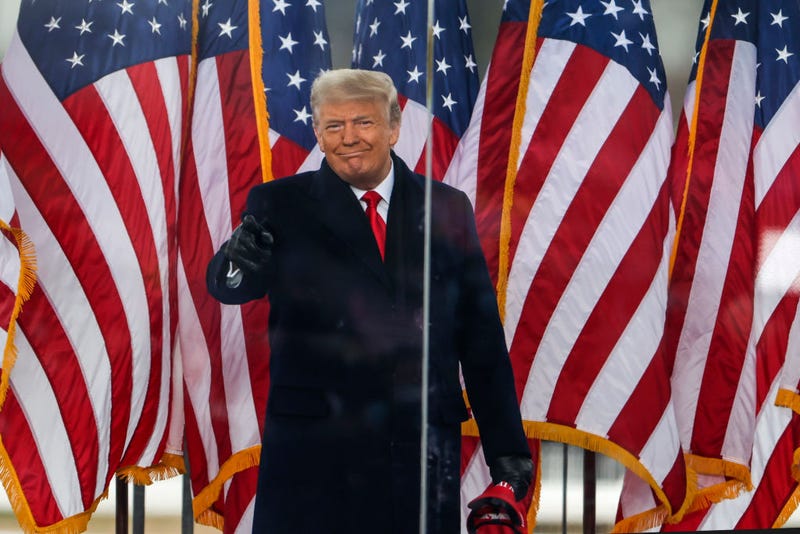
Former President Donald Trump encouraged top Justice Department officials to declare the 2020 election was corrupt despite evidence to the contrary, said a New York Times report published Friday.
Documents provided to lawmakers and obtained by The New York Times informed the report, said the outlet.
Listen to your favorite News/Talk station now on Audacy.
According to the report, Trump pressed Jeffery A. Rosen, who was then acting attorney general, on voter fraud claims that the 45th president and his supporters had been circulating during a Dec. 27 phone call. Rosen’s deputy. Richard P. Donoghue, was also on the call.
Voter fraud claims began to spread before the November election was held and were disproved by the Justice Department before the call took place.
During the call, Donoghue warned Trump that the Justice Department has no power to change the outcome of elections. Trump said that wasn’t his expectation.
“Just say that the election was corrupt + leave the rest to me,” Donoghue wrote in summarizing Trump’s response, according to the New York Times.
The Justice Department has provided Mr. Donoghue’s notes to the House Oversight and Reform Committee, said the outlet. This committee is investigating the Trump administration’s efforts to unlawfully reverse the election results.
Trump’s demands during the call were unusual, as presidents do not typically interfere with the Department of Justice, an agency independent from the White House. He also indicated to Rosen and Donoghue that allies in Congress would help him promote the corruption claims.
Though Trump did not specifically name those lawmakers, he mentioned Rep. Jim Jordan of Ohio, Rep. Scott Perry of Pennsylvania and Sen. Ron Johnson of Wisconsin at other points during the call.
Jordan voted to overturn election results in key states but denies having played a role in pressuring the Justice Department.
“Congressman Jordan did not, has not, and would not pressure anyone at the Justice Department about the 2020 election,” said his spokesman, Russell Dye, according to the New York Times. “He continues to agree with President Trump that it is perfectly appropriate to raise concerns about election integrity.”
Perry has continued to claim that Trump won the election and Johnson has said questions about 2020 election integrity are reasonable, though he recognizes President Joe Biden. Neither have been officially linked to Trump’s attempt to pressure the Justice Department.
Although the department usually aims to keep private communication between staff and the president secret, notes were to Congress based on the department’s belief that Trump was trying to further a personal agenda during the call rather than act as a head of state.
“These handwritten notes show that President Trump directly instructed our nation’s top law enforcement agency to take steps to overturn a free and fair election in the final days of his presidency,” Rep. Carolyn B. Maloney, Democrat of New York and chairwoman of the House Oversight and Reform Committee, said in a statement.
Investigations by the Justice Department found the error rate of ballot counting in Michigan was 0.0063 percent, not the 68 percent that Trump claimed. Furthermore, it did not find evidence of claims that an employee in Pennsylvania had tampered with ballots and it found no evidence of alleged ballot fraud in Fulton County, Ga., according to the notes.
Trump disregarded these findings, said the Times.
“Ok fine — but what about the others?” Mr. Donoghue wrote in his notes describing the president’s remarks.
Even so, the department held firm that they could only make announcement backed up with evidence they had found. Eventually, Trump seemingly threatened to make Jeff Clark, who was at the time of the call the acting chief of the Justice Department’s civil division, the department's top official.
“You should have the leadership you want,” Donoghue told Trump. But it “won’t change the dept’s position.”
In addition to pressuring the department to support claims of election corruption, Trump also suggested an investigation into Biden’s son Hunter during the call. Doing so violated longstanding guidelines against White House intervention in criminal investigations or other law enforcement actions, said the Times.





